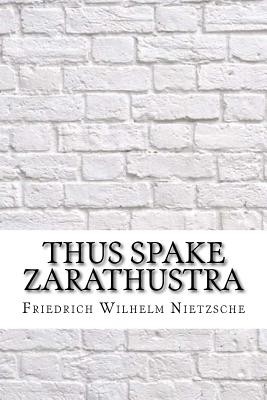
- We will send in 10–14 business days.
- Author: Friedrich Wilhelm Nietzsche
- Publisher: CreateSpace Independent Publishing Platform
- Year: 2017
- ISBN-10: 1974202100
- ISBN-13: 9781974202102
- Format: 15.2 x 22.9 x 1.9 cm, minkšti viršeliai
- Language: English
- SAVE -10% with code: EXTRA
Reviews
Description
Thus Spoke Zarathustra (German: Also sprach Zarathustra, sometimes translated Thus Spake Zarathustra), subtitled A Book for All and None (Ein Buch für Alle und Keinen), is a written work by German philosopher Friedrich Nietzsche, composed in four parts between 1883 and 1885. Much of the work deals with ideas such as the "eternal recurrence of the same", the parable on the "death of God", and the "prophecy" of the Overman, which were first introduced in The Gay Science. Described by Nietzsche himself as "the deepest ever written", the book is a dense and esoteric treatise on philosophy and morality, featuring as protagonist a fictionalized Zarathustra. A central irony of the text is that the style of the Bible is used by Nietzsche to present ideas of his which fundamentally oppose Judaeo-Christian morality and tradition.
EXTRA 10 % discount with code: EXTRA
The promotion ends in 23d.12:14:50
The discount code is valid when purchasing from 10 €. Discounts do not stack.
- Author: Friedrich Wilhelm Nietzsche
- Publisher: CreateSpace Independent Publishing Platform
- Year: 2017
- ISBN-10: 1974202100
- ISBN-13: 9781974202102
- Format: 15.2 x 22.9 x 1.9 cm, minkšti viršeliai
- Language: English English
Thus Spoke Zarathustra (German: Also sprach Zarathustra, sometimes translated Thus Spake Zarathustra), subtitled A Book for All and None (Ein Buch für Alle und Keinen), is a written work by German philosopher Friedrich Nietzsche, composed in four parts between 1883 and 1885. Much of the work deals with ideas such as the "eternal recurrence of the same", the parable on the "death of God", and the "prophecy" of the Overman, which were first introduced in The Gay Science. Described by Nietzsche himself as "the deepest ever written", the book is a dense and esoteric treatise on philosophy and morality, featuring as protagonist a fictionalized Zarathustra. A central irony of the text is that the style of the Bible is used by Nietzsche to present ideas of his which fundamentally oppose Judaeo-Christian morality and tradition.


Reviews